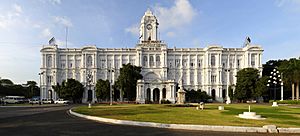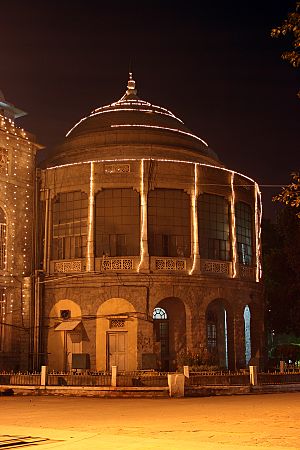Municipal corporation facts for kids
A municipal corporation is a special type of local government. It helps run big cities and towns. When a city grows very large, it can become a municipal corporation. This means it gets the power to govern itself. It manages many important services for the people living there.
Contents
What is a Municipal Charter?
A municipal charter is a legal document. Think of it like a city's rulebook or birth certificate. This paper officially creates a city or town. It gives the new city special rights and powers. These charters first appeared in Europe during the Middle Ages. They helped new towns become independent.
How Cities Get Their Powers Around the World
Different countries have different ways of creating municipal corporations or cities.
Canada
In Canada, the powers for cities come from the provincial authorities. Each province decides how its cities are formed.
Germany
In Germany, municipal charters have been around for a very long time. They existed even during the Medieval Times.
India
In India, a municipal corporation manages cities with 200,000 people or more. These city governments work closely with the state government. Some of the biggest municipal corporations are in Mumbai, Delhi, Kolkata, Bangalore, Chennai, Hyderabad, and Ahmedabad.
People living in different parts of the city, called "wards," choose their leaders. These leaders then work for the municipal corporation.
Municipal corporations in India are in charge of many things. They build and fix roads. They also manage public transportation and water supply. Keeping records of births and deaths is another important job. They handle sanitation, which means managing waste, sewage, and drainage. They also help with flood control. Public safety services, like fire and ambulance, are also their responsibility. They even take care of city gardens and buildings.
To pay for all these services, municipal corporations collect taxes from the people and businesses in the city.
Republic of Ireland
In Ireland, municipal corporations have been present since the Medieval Times. The municipal corporation in Dublin has been active since the 13th century.
South Africa
In Durban, South Africa, the local city government used to be called the "Durban Corporation."
Sweden
In Sweden, cities were officially created by a special royal document. This system lasted until 1951.
Philippines
In the Philippines, cities are formed by laws. These laws are passed by the national legislature.
United Kingdom
In the United Kingdom, cities are created by a special royal document. This document is called a royal letter patent.
United States
In the United States, cities are usually formed by municipal charters. Often, people living in the area vote to approve this charter.
 | Kyle Baker |
 | Joseph Yoakum |
 | Laura Wheeler Waring |
 | Henry Ossawa Tanner |



